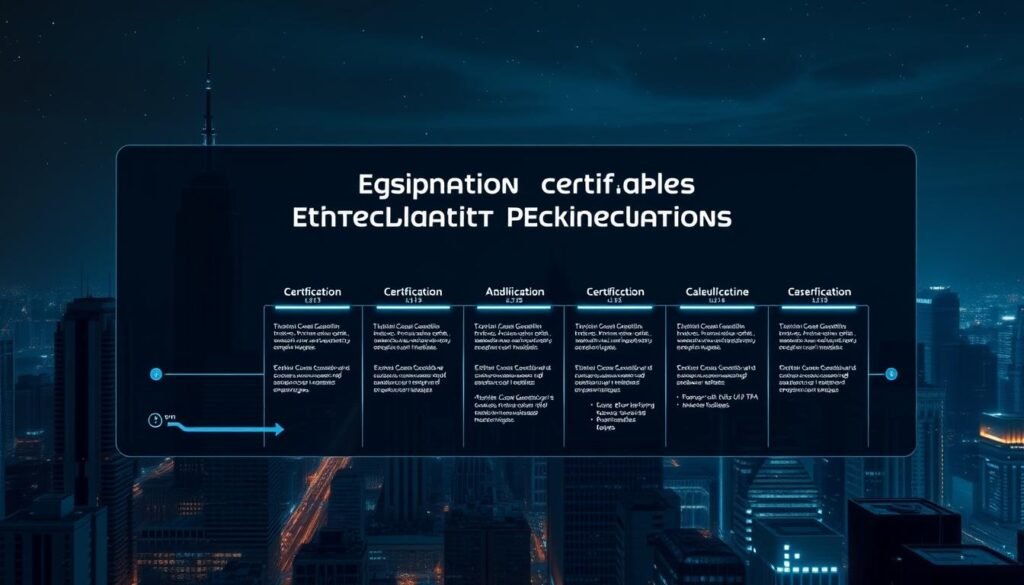Did you know over 3.5 million cybersecurity jobs are open worldwide? This shows a big chance for those wanting to start in cybersecurity.
Learning to be an ethical hacker is not just a skill. It’s a key way to fight off cyber threats. This guide will show you how to start your journey in ethical hacking.
Ethical hacking, or penetration testing, is legal hacking to find weak spots in systems. With cybersecurity growing 31% by 2029, the need for experts is huge. They help keep companies safe from hackers.
Key Takeaways
- Ethical hacking offers lucrative career opportunities with salaries ranging from $70,000 to $200,000
- No prior cybersecurity experience is required to start your journey
- Multiple learning paths exist, including free online courses and self-study
- Certifications significantly improve job prospects in the cybersecurity field
- Practical experience through bug bounty programs can accelerate career growth
Introduction
The world of cybersecurity is changing fast. It offers great chances for those who want to protect digital stuff. An ethical hacker roadmap is a path that mixes tech skills with solving big problems.
Why Ethical Hacking is a Lucrative Career
Cybersecurity is a big deal for companies all over. The need for ethical hacking skills is high. This means you can find great jobs in many fields.
- Average annual salary ranges from $70,000 to $120,000
- Growing demand in technology, finance, and government sectors
- Potential for freelance and consulting work
What Does an Ethical Hacker Do?
Ethical hackers, also known as white-hat hackers, do the same things as bad hackers but for good. They test systems to make them safer. They might do penetration testing to find and fix problems before bad guys can.
“In the world of cybersecurity, ethical hackers are the guardians who stay one step ahead of possible threats.” – Cybersecurity Expert
| Key Responsibilities | Required Skills |
|---|---|
| Vulnerability Assessment | Network Security Knowledge |
| Penetration Testing | Programming Skills |
| Security Consultation | Analytical Thinking |
Step 1: Learn Networking and Security Basics

Starting your journey as an ethical hacker means learning networking basics. The world of cybersecurity needs people with strong technical skills. It’s key to know the basics of networking and security.
Those wanting to be ethical hackers must understand network infrastructure well. The world is short on cybersecurity workers, with nearly four million needed. This creates great chances for those who learn.
Understanding Network Protocols and Security
Focus on learning the networking basics that are vital for ethical hacking career development. Important topics include:
- TCP/IP protocols
- Firewall configurations
- Virtual Private Network (VPN) technologies
- Network topology
- Packet transmission mechanisms
Essential Cybersecurity Concepts for Beginners
Ethical hacking for beginners needs a clear learning plan. The best courses mix practical skills with theory. Getting a certification like CompTIA Security+ can help you earn over $80,000 a year.
“In cybersecurity, knowledge is your most powerful weapon.” – Cybersecurity Expert
To learn faster, look for training that lets you practice with real scenarios. The field of cybersecurity is growing fast, with a 33% increase expected soon.
Step 2: Learn a Programming Language

Starting your journey in ethical hacking means learning programming languages. These are your digital tools. Skills in programming are key for those who want to be ethical and do well in cybersecurity.
Python is the best choice for ethical hacking. It’s easy to use and very versatile. It has a huge library that helps cybersecurity experts a lot. Here are the main programming languages you need for ethical hacking:
- Python: The top pick for beginners
- Bash: Essential for security automation
- C: Important for working with systems at a low level
- JavaScript: Key for web security
- SQL: Very important for keeping databases safe
Python: The Ethical Hacker’s Best Friend
Python is a standout for learning ethical hacking. It has powerful libraries like:
- Scapy: Helps with network packet creation and analysis
- Requests: Makes web communication easier
- Beautiful Soup: Great for scraping website info
- Nmap: Essential for network scanning
- Metasploit: Great for penetration testing
“Python is the most widely used programming language in cybersecurity” – Industry Experts
Knowing these languages well will boost your chances in ethical hacking certification and jobs. While not all cybersecurity jobs need deep programming skills, knowing Python can lead to roles in penetration testing and security engineering.
Step 3: Get Hands-on With Ethical Hacking Tools

To become a white hat hacker, you need to learn about special tools. These tools help find and fix security problems. The right tools make your hacking skills real.
Essential Penetration Testing Tools
Penetration testing needs strong tools. Here are key tools for beginners:
- Metasploit: A full penetration testing framework
- Nmap: Finds and checks network security
- Wireshark: Analyzes network protocols
- Burp Suite: Scans for web vulnerabilities
Kali Linux: The Ethical Hacker’s Operating System
Kali Linux is top for cybersecurity pros. It has many security tools ready to use. It’s great for learning ethical hacking.
| Tool Category | Primary Function | Skill Level |
|---|---|---|
| Reconnaissance | Scans networks and gathers info | Beginner |
| Exploitation | Finds and tests system weaknesses | Intermediate |
| Post-Exploitation | Checks how much damage can be done | Advanced |
“The best defense is a good offense” – This principle perfectly encapsulates the essence of ethical hacking.
To get better at ethical hacking, practice on Hack The Box and TryHackMe. These sites give you real places to test your skills.
Step 4: Earn Ethical Hacking Certifications

Choosing the right certifications is key in the cybersecurity world. Ethical hacking certifications boost your credibility and open new doors in tech.
Picking the best ethical hacking certification can change your career path. The cybersecurity world needs constant skill checks. This makes certifications vital for moving up in your career.
Top Certifications for Ethical Hackers
- Certified Ethical Hacker (CEH)
- Offensive Security Certified Professional (OSCP)
- CompTIA Security+
- GIAC Security Essentials
| Certification | Cost | Exam Details |
|---|---|---|
| CEH | $1,199 | 4-hour exam, 125 multiple-choice questions |
| OSCP | $1,299 | Practical hands-on penetration testing exam |
| CompTIA Security+ | $392 | 90 minutes, 90 multiple-choice questions |
Building Credibility in Cybersecurity
Getting the best ethical hacking courses and certifications shows you’re serious about growing. Certifications prove your skills and can really up your salary in cybersecurity.
“Certifications are not just pieces of paper—they’re your passport to advanced cybersecurity opportunities.” – Cybersecurity Professional
Keep learning. The cybersecurity world changes fast. Staying current with certifications keeps you ahead in this fast-paced field.
Step 5: Gain Real-World Experience

Turning theory into practice is key for future ethical hackers. The world of cybersecurity needs hands-on skills. This is true for both penetration testing and bug bounty and ethical hacking.
Setting Up a Home Lab
First, set up a safe space for hacking legally. A home lab lets you:
- Simulate network environments
- Test security vulnerabilities
- Practice penetration testing techniques
- Experiment without risking actual systems
“A well-configured home lab is your personal cybersecurity playground.” – Cybersecurity Expert
Participating in Bug Bounty Programs
Bug bounty programs are great for gaining real-world experience. You can earn rewards while helping companies find security issues.
| Platform | Key Features | Potential Earnings |
|---|---|---|
| HackerOne | Largest bug bounty platform | $100 – $50,000 per vulnerability |
| Bugcrowd | Diverse industry challenges | $150 – $30,000 per report |
| Synack | Vetted researcher network | $200 – $25,000 per finding |
Joining these programs boosts your practical cybersecurity skills. It also helps you build a strong reputation in the ethical hacking world.
Conclusion
Starting an ethical hacker career needs hard work, constant learning, and a love for cybersecurity. It’s not just about knowing tech skills. It’s also about being proactive in keeping digital spaces safe.
The job market for cybersecurity is growing fast, with a 33% increase expected by 2033. This makes being a white hat hacker a promising and well-paying job.
Your path will ask for ongoing skill improvement and keeping up with new cyber threats. There’s a big need for 4.8 million cybersecurity experts worldwide. Getting certifications like OSCP and CEH can boost your career. Also, doing penetration tests and bug bounty programs will make you better at your job.
Being an ethical hacker is not just a job. It’s a promise to protect digital worlds and keep technology safe. You can earn between $95,000 and $140,000 a year. This job gives you financial benefits and a chance to really help in the fight against cyber attacks.
Keep being ethical, keep learning, and see every problem as a chance to grow. The world of cybersecurity values those who are curious, flexible, and always learning. Your role in keeping digital spaces safe is huge, and the future is full of great chances.
FAQ
What is an ethical hacker?
How long does it take to become an ethical hacker?
What programming languages are most important for ethical hacking?
Do I need a college degree to become an ethical hacker?
What certifications are most valuable for ethical hackers?
How can I practice ethical hacking legally?
What is the average salary for an ethical hacker?
What tools do ethical hackers commonly use?
Is ethical hacking a good career choice?
How can I get started in ethical hacking with no experience?
Source Links
- FREE Ethical Hacking Course by Udemy for College Students in Any Stream – Apply Today 2025
- Ethical Hacking | The Offensive Side of Cyber Security
- Ethical Hacking – Web Asha Technologies
- STEM Workshop – Intellectual Point
- 5 Best Books for Aspiring Ethical Hackers in 2025 – FROMDEV
- 5 steps to launch your cybersecurity career in 2025 – General Assembly
- Can I Learn Cyber Security in 3 Months? A Step-by-Step Guide for Beginners
- Cybersecurity Course for Beginners | Where to Start?
- 5 Best Programming Languages for Hacking in 2025 – AppinLab
- Top Programming Languages for Cybersecurity | Which One Should You Learn First?
- Is Coding Compulsory for Cybersecurity? A Beginner’s Guide to Understanding Its Importance
- How to Become a Cybersecurity Analyst in 2025 – A Beginner’s Step-by-Step Guide | EdYoda Micro Blog
- Master Ethical Hacking with Expert Buddy: Your Cybersecurity Guide .
- Recommended
- 5 Best Cybersecurity Certifications for Beginners
- Cybersecurity Career Path: How to Start & Grow Your Security Career
- Kickstart Your Cybersecurity Career: 5 Essential Steps to Success
- How to Get Started with Penetration Testing and Gain Practical Experience
- Understanding the Types of Ethical Hacking for Cybersecurity
- Ethical Hacking vs. Penetration Testing: Which one is Better?
- Are Entry-Level Cyber Security Jobs Worth Pursuing?
